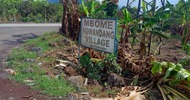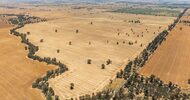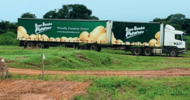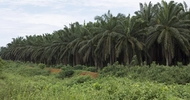The Independent (UK) | Sunday, 3 May 2009
Neo-colonialists are buying up agricultural land in Africa – and local farmers could be crushed unless there are international rules to protect them. Margareta Pagano reports
In Africa they are calling it the land grab, or the new colonialism. Countries hungry to secure their food supplies – including Saudi Arabia, the Emirates, South Korea (the world's third biggest importer of corn) China, India, Libya and Egypt – are at the forefront of a frantic rush to gobble up farmland all around the world, but mainly cash-starved Africa.
Over the past few months, Saudi Arabian investors have paid $100m for an Ethiopian farm where they hope to grow wheat and barley, adding to the millions of acres they already own in the war-ravaged country, as well as in neighbouring Sudan. The Saudis also have land in Indonesia and Thailand for growing rice. China owns vast tracts of overseas land, mainly in Algeria and Zimbabwe, and one estimate suggests that more than a million ethnic Chinese farm workers will be living on the continent this year. Kenya and Tanzania have leased land while the Ugandans have been big sellers, allocating two million acres of land to Egypt for wheat and corn.
Further afield, the Saudi government and other Gulf States are negotiating with Pakistan to buy another million acres. The deal includes the services of a 100,000-man private army to protect the food being exported. Buyers or lease-holders have have also been promised legal cover in case a future government in Islamabad is less welcoming.
Soaring wheat and rice prices over the past two years – which have caused riots in more than 30 countries from India to Haiti – were the catalyst for the latest dash for land. But the rush really took off at the end of last year when many big food-exporting nations introduced export controls.
Food scares hit Saudi, Kuwait, Bahrain and other Arab states the hardest, because they felt particulary vulnerable as their own efforts to grow crops in the desert have proved costly and inefficient. By far the most aggressive buyer is Saudi Arabia, where the government is now actively encouraging private investors and companies to buy farmland abroad after abandoning its attempt to be self-sufficient because of worries over water scarcity. It cut its wheat production by 12.5 per cent last year, prompting the search for new land.
Not every country is opening its arms to these new landlords with as much enthusiasm as Pakistan. In Madagascar, public anger over a plan to sell more than a million hectares to South Korea's Daewoo on a 99-year lease forced the government to drop the deal and was one of the reasons for the recent change in president.
But the issue is not a clear-cut case of neo-imperialism. At the African Union (AU), the agriculture commissioner, Rhoda Peace Tumusiime, is worried that many land buyers are ignoring the interests of local farmers and communities. But the AU also recognises that bringing new capital into Africa could be positive if it is directed in the right way. Instead of purchasing land, she says, buyers or lease-holders should invest through production and trade agreements with the host country.
Deals which increased overall food production should be encouraged, a move which would bring more food to the international markets, as well as to the poorest African households, Tumusiime said. Some of the AU's new guidelines on land sales, due to be ratified in July, include recommendations that new investors should promise to help with infrastructure, such as health facilities, agree to pay local taxation and look at ways to get more involved on the food-processing side which would create more local jobs.
David Hallam, the deputy director of the trade and markets division at the Food and Agriculture Organisation (FAO), part of the UN, also cautions about making over-hasty judgements on such a sensitive issue. "This could be a win-win situation or it could be a sort of neo-colonialism with disastrous consequences for some of the countries involved. I really do have an open mind to whether this new development is positive or not." On Tuesday, Hallam will be opening a conference at the Woodrow Wilson Center in Washington provocatively called "Land Grab: The Race for the World's Farmlands", at which some of the world's leading food experts will try to get a better grip of what is happening. Sovereignty over the land and food supplies is the biggest concern, says Hallam. "There is a danger that host countries, particularly the more politically sensitive and food-insecure, will lose control over their own food supplies when they need it most."
Imagine, he says, empty trucks being driven into, say, Ethiopia, at a time of food shortages caused by war or drought, and being driven out again full of grain to feed people overseas. "Can you imagine the political consequences? That's why proper legal structures need to be put into place to protect land rights, and why we should look at some form of international code of conduct."
Hallam is carrying out his own detailed research with FAO people on the ground because so few figures exist. The first stab at gathering numbers was made by the International Food Policy Research Institute, which reported last week. It estimated that 20 million hectares of land – twice the size of Germany's croplands – have been sold since 2006 in more than four dozen land deals, mainly in Africa. So far, most of the buyers are a mix of private investors, US private equity houses such as Sanlam Private Equity, the Saudi Kingdom Zephyr fund, the UK's CDC and sovereign wealth funds.
The institute's report will not be the last: at least five separate studies into the phenomenon are due over the next few months as international bodies and NGOs wake up to the danger. The International Institute for Environment and Development, for example, is particularly worried about the impact on local communities and the threat to local output. It will publish its latest research in the next few weeks.
Subsistence farmers and nomadic tribesmen are of particular concern, since many of them do not have titles to their land and could be easily exploited by their own governments, which are desperate to sell to boost their foreign reserves.
Ruth Meinzen-Dick, a senior research fellow at the International Food Policy Research Institute, who is due to speak at the Washington conference, warned: "The majority of agricultural land in Africa is not titled. If these rights are not respected in these transactions, the livelihoods of millions of people will be put at risk."
If the latest invasion of overseas money can be handled well, it could bring huge advantages to Africa after a generation of declining investment. "For more than two decades, we have been trying to persuade governments and investors around the world to invest in agriculture to halt the downturn in food production," Hallam says. "So it is difficult for us to turn around and argue against it now."
Much of the new money is going into capital intensive farming – and speculative bio-fuel crops – which do not bring great benefits to local farmers. Hallam's report, prepared with the UN's development agency, UNCTAD and the World Bank, will also be published later this summer.
Food security and encouraging more of the right sort of investment in agriculture was top of the agenda at the G8 agricultural summit in Italy last month. For the first time, the G8 ministers conceded that efforts to tackle hunger were failing, and that the UN's attempts to halve the number of malnourished by 2015 were way off target. Wheat and grain prices have fallen since last year's spike, but they are still high; so high that the FAO predicts the number of chronically hungry will shoot up by 100 million this year – on top of the 1.4 billion people already living on the poverty line.














